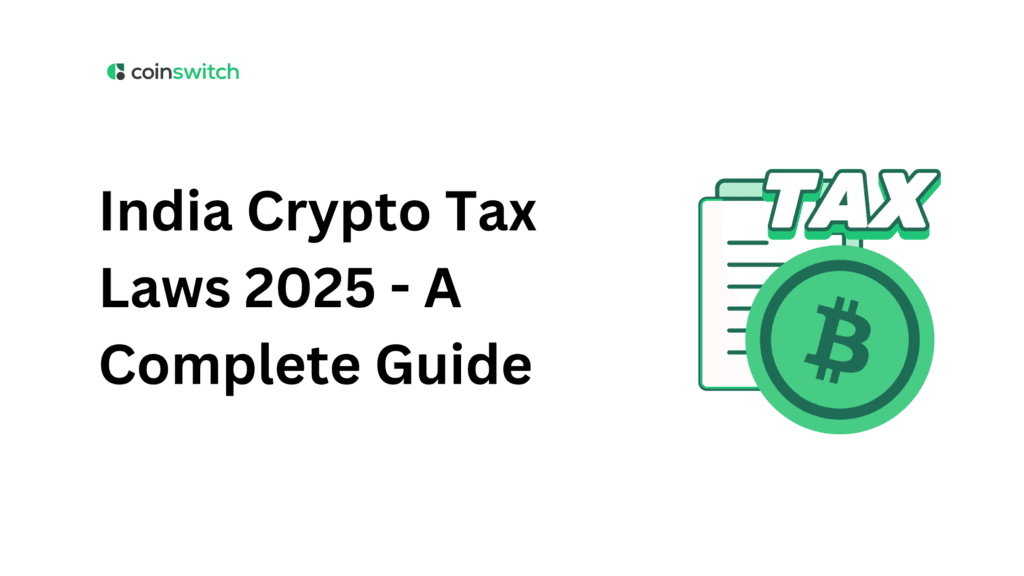Understanding Crypto Taxes in India (2025)
Haven’t filed your taxes yet? Don’t know how to declare your crypto assets? You’re not alone. At CoinSwitch we aim to simplify modern finance and help you with everything crypto. Since 2022, the Indian government has enforced a rigid tax regime targeting Virtual Digital Assets (VDAs) like Bitcoin, Ethereum, NFTs, and others.
In 2025, those rules are stricter than ever, and failure to comply could cost you more than just money.
Let’s break down the key regulations you need to know, whether you’re an investor, trader, or miner.
Key Crypto Tax Rules in India
1. Flat 30% Tax on All Crypto Gains
Crypto gains are taxed at a uniform rate of 30%, along with applicable surcharge and cess. This applies to all profits, regardless of your income bracket or holding period.
Tax applies to:
- Selling crypto for INR
- Trading crypto (e.g., BTC to ETH)
- Spending crypto on goods/services
*Note: Only the acquisition cost is deductible. Operational expenses such as gas or exchange fees are not.
2. Offsetting Crypto Losses
Current regulations do not permit offsetting crypto losses:
- Losses from one VDA cannot offset gains from another
- Losses cannot be carried forward to future financial years
- Crypto losses cannot reduce income from other sources like salary or business
This means you’re taxed on gains but get no credit for losses.
3. 1% TDS on Crypto Transfer
Since July 2022, a 1% Tax Deducted at Source (TDS) applies on the full value of all crypto transfers:
- Indian exchanges deduct TDS automatically
- In P2P or OTC deals, the buyer must deduct and deposit TDS
- Threshold: ₹10,000/year (₹50,000 for small traders/HUFs)
This data is reported in your Form 26AS and Annual Information Statement (AIS)—so the taxman already knows.
4. Taxation on Crypto Mining, Airdrops & Gifts
- Mining:
- Treated as self-generated. Taxed at 30% with zero acquisition cost. Mining expenses aren’t deductible.
- Treated as self-generated. Taxed at 30% with zero acquisition cost. Mining expenses aren’t deductible.
- Airdrops, staking, yield farming: Taxed twice:
- At receipt (as regular income at slab rate)
- On sale (flat 30%)
- At receipt (as regular income at slab rate)
- Gifts:
- From non-relatives over ₹50,000/year: Taxable
- From relatives: Exempt
- All gifts taxed again when sold
- From non-relatives over ₹50,000/year: Taxable
Crypto vs. Traditional Assets: Comparison
| Feature | Crypto (VDAs) | Stocks & Mutual Funds |
| Tax Rate | 30% flat + cess | 15% STCG, 10% LTCG |
| Expense Deductions | None (except cost) | Allowed (e.g. brokerage) |
| Loss Set-Off | ❌ Not allowed | ✅ Allowed |
| Carry Forward Losses | ❌ Not allowed | ✅ Up to 8 years |
| Indexation | ❌ No | ✅ Available (debt funds) |
Reporting Crypto in ITR: Schedule VDA
All crypto transactions must be declared under Schedule VDA in your Income Tax Return.
What’s reported:
- Date of purchase and sale
- Asset name
- Purchase and sale value
- TDS paid
Penalties for Non-Compliance
- Penalty: 50%–200% of tax due
- Possible imprisonment (up to 7 years)
- Automated notices sent via Project Insight, NMS, and NUDGE
Global Moves & India’s Next Steps
1. OECD’s Crypto-Asset Reporting Framework (CARF) Adoption by 2027
India plans to adopt the OECD Crypto-Asset Reporting Framework (CARF) by April 2027. This move aligns India with global tax standards and enhances cooperation on cross-border reporting.
Once implemented:
- Offshore exchanges will be within regulatory purview
- All global transactions by Indian residents will be reportable
2. 18% GST on Crypto Platform Services
From July 2025, crypto exchanges and wallet services are subject to 18% GST. This includes:
- Trading fees
- Deposit/withdrawal fees
- Platform subscriptions
This reform enhances accountability across domestic and international exchanges.
3. AI-Powered Tax Monitoring
The government is using advanced analytics through:
- Project Insight: Tracks financial behavior
- NMS (Non-Filers Monitoring System): Identifies potential non-filers
- NUDGE Notices: Sends reminders to under-reporters
Together, these tools promote voluntary compliance and early intervention.
How Traders Are Adapting
- Shifting to Futures & Options: Crypto derivative instruments not yet covered under 30% tax or 1% TDS
- Increased Use of Offshore Platforms: Subject to reporting rules but still favored for broader access
- Structuring via Gifts or Loans: Some use permissible routes to delay tax events
*Note: While these strategies may optimize timing, compliance remains essential.
Key Takeaways
- Crypto is legal and regulated in India
- Flat 30% tax applies to all gains; no loss adjustment permitted
- 1% TDS ensures transaction-level reporting
- Mining, airdrops, and gifts are also taxed appropriately
- Penalties apply for non-compliance or under-reporting
- India is aligning with OECD standards and using AI tools to modernize tax administration
Read More: Is Bitcoin legal in India?
FAQs
Crypto gains are subject to 30% tax (along with 4% cess & applicable surcharge) under Section 115BBH. 1% TDS is deducted on transfer of crypto assets.
Taxed at 30% with zero acquisition cost. Mining expenses aren’t deductible.
No. Under current guidelines, losses can’t be set off or carried forward.
1. Indian exchanges: They deduct it at the time of sale.
2. P2P or OTC trades: Buyer is responsible.
Under Schedule VDA. Include detailed transaction information; date, amount and asset type.
There may be penalties, interest, or prosecution depending on severity.
Yes, Indian residents must report global crypto holdings and gains.
Yes, it’s legal to buy, sell, hold and invest in crypto with clear tax obligations. But it’s not legal tender.








